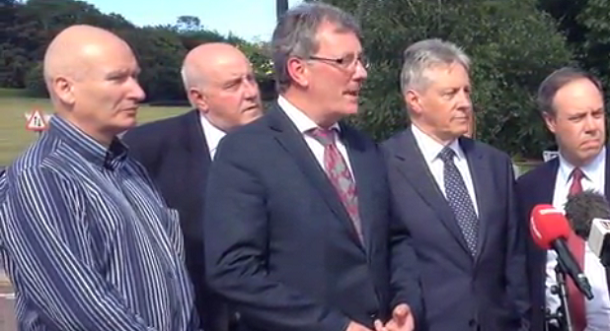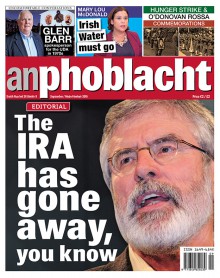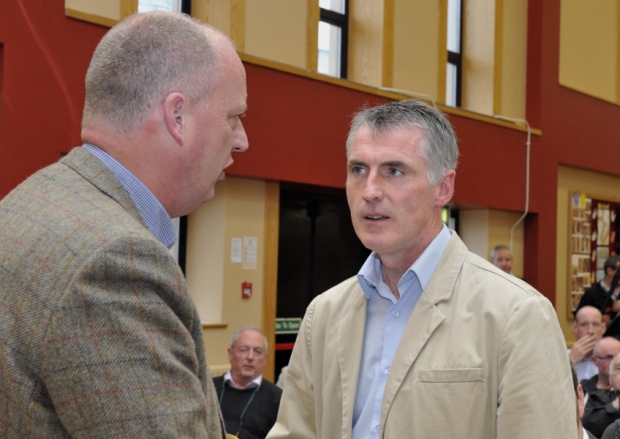13 September 2015
'Northern political crisis threatens the primacy of democratic politics'

THE GLOBAL financial and resulting economic crises of 2007-2008 have had a huge influence on politics across Europe and beyond.
Increased inequality has been created. Austerity has been promoted by the conservative Right as the only model capable of stabilising the global financial system and reducing the deficits now bankrupting national economies.
A new battle of ideas has been waged between capital and labour, and Right and Left, about how to reorganise the political economy in Europe.
New balances of political forces have begun to emerge as a direct result of an emboldened austerian conservative Right and the collapse of social democracy.
Whilst conservative and extreme right-wing parties entrench and seek to extend their hegemony in government and society, new left-wing and popular, progressive political forces have grown and emerged.
All of this is evidenced in the evolving state of politics in Ireland and Britain.
The combined effect of economic instability and the decision by a previous British Labour government to devolve government arrangements to Scotland and Wales has been a catalyst for unparalleled flux within the British state.
The Scottish referendum and its result last year was one indicator of a major shift in politics.
This year's Westminster election was a further example as the Scottish National Party – on an anti-austerity platform – took 56 out of 59 Westminster seats.
Scheduled elections in May 2016 are likely to entrench that trend.
The election of a majority Conservative government last May on a manifesto to conduct a “Br-Exit” referendum, impose harsher austerity, and roll back civil liberties and democratic and human rights (including workers’ rights) will directly impact upon new emerging alignments within British society and the future constitutional status of Scotland in particular.
The Labour leadership election result and future prospects for the British Labour Party will also become part of that mix.
So the British state as we know it is being subject to political and social realignments which may result in new balances of forces emerging regarding Britain's relationship to Europe as well as a new momentum for Scottish independence and potentially irrevocable constitutional change.
Against that context, the Northern state remains contested in terms of its relationship to the British state and the unresolved issue of Irish national democracy.
The Good Friday Agreement represents a framework of principles and political structures negotiated to embed conflict resolution and the fledgling peace process.
It opened a democratic road forward to resolve the causes and conditions of political conflict in Ireland.
It was a historic compromise between opponents and conferred an international responsibility on both the British and Irish governments to ensure its implementation as a binding international agreement.
Its significance was in recognising that the status quo had failed Irish society and that shaping the future would depend upon the management of change through democratic compromise and agreement.
Nothing could or would remain the same.
Equality of treatment, parity of esteem and mutual respect were set out as the new benchmarks.
From the outset, political unionism failed to unequivocally support these principles and significant sections have remained deeply hostile to power-sharing and partnership government with republicans and nationalists – and particularly with Sinn Féin – ever since.
Critical faultlines remain, specifically with respect to the exercise of parity of esteem and mutual respect, the eradication of sectarianism and sectarian segregation, failure to deal with the legacy of the past, and the development of reconciliation and healing in the North.
The consequence has been that the peace and political processes have remained constantly fragile throughout.
Last year in my address to the Desmond Greaves School, I reported that the political instability in the North had intensified due to the dominance of bad and negative leadership within political unionism, and that a crisis within political unionism was being exacerbated by sectarian electoral competition and co-operation among unionist politicians and paramilitaries.
I made clear that both the Irish and British governments had stepped back from their responsibilities.
It was explained that while the Democratic Unionist Party and the Ulster Unionist Party may well have bought into the political institutions in terms of electoral influence, salaries and status, this did not extend to embracing a genuine willingness to share power with republicans; support for real partnership government; the development of North/South co-operation; or support for mutual respect, parity of esteem or reconciliation.
Twelve months ago, the North faced a political impasse which contained all the ingredients to develop into a full political crisis.
In recent days and weeks, the North has been pushed directly into a very deep, dangerous and escalating crisis.
Last May and then in August, Jock Davison and Kevin McGuigan were killed in Belfast. Two Belfast families have been plunged into unimaginable grief.
Both murders were appalling. Sinn Féin has called for every assistance to be given to the police investigation so those responsible can be brought to justice.
Let me be clear: both murders were carried out by criminals. Those responsible were not republicans; they were criminals and enemies of the Peace Process.

● Ulster Unionist Party leader Mike Nesbitt and Democratic Unionist Party leader Peter Robinson hold a joint press conference with parties representing loyalist paramilitaries
In the weeks that have followed, these murders have been cynically exploited by political unionism for narrow party political self-interest.
The leaders of political unionism are now playing fast and loose with the future of the political institutions at Stormont.
The cynical manoeuvring of the DUP and UUP is not about the killings in Belfast; instead it is the latest round of the sham fight between the unionist parties for electoral success.
Both the UUP and DUP in efforts to politically out-manoeuvre each other now risk collapsing the political institutions, despite the enormous impact this would have on society in the North, in an effort to score a victory over each other.
This disgraceful opportunism jeopardises the future of the institutions and also the relationships that have been built up in recent years.
It encourages those who carried out the murders and those who directed them.
It also encourages enemies and opponents of the peace and political processes.
This is a matter of grave concern.
Much has been said about damage to confidence and trust in the last three weeks and the need for that to be rebuilt. But the focus has been exclusively on Sinn Féin.
Significantly, there has been no focus or concern on the damage done to confidence within the republican and nationalist constituency for policing as a result of the commentary from the PSNI and the arrest of Sinn Fein's Northern chairperson, Bobby Storey.
Comments made during a PSNI murder inquiry press conference quickly morphed a tragic situation into political and media frenzy.
However, confidence within republicanism and nationalism towards political unionism has been seriously undermined due to the double standards and base hypocrisy displayed by the unionist parties as the UUP jockey for electoral and political advantage over the DUP.
And there is also anger at the partisan and hostile attitude of representatives from both the British and Irish governments about the building crisis, whilst posturing as neutral referees – a crisis which, in our opinion, has been deliberately contrived.
This has been instanced by utterly unwarranted and gratuitous attacks by An Taoiseach and other Irish Government spokespersons on the Sinn Féin leadership.
These circumstances have been seized upon by Irish Government ministers in particular to launch a new and choreographed vilification of the Sinn Féin leadership.
An escalating political crisis does exist. But it has nothing to do with the fiction of an existing IRA.
Attempting to explain away the current serious political situation by using the pretext of an IRA which has gone away is a complete diversion.
Let me make this clear and categorical.
The only republican organisation on the stage is Sinn Féin; with an electoral mandate of half a million citizens and growing, across this island.
The only republican leadership and authority within republicanism is the Sinn Féin Ard Chomhairle.
Parallel republican organisations, leaderships or authorities do not exist.

When the IRA left the stage in 2005, it did so to create the space for the primacy of politics and primacy of the Sinn Féin leadership to flourish within republicanism.
The IRA did everything it had to do. It remained true to the spirit and outcome of its 2005 initiative.
To have done otherwise would have been a contradiction in terms and counter to the development of Sinn Féin's peace strategy.
Those within the two governments, the PSNI, and opposing political parties who attempt to assert otherwise all know that to be the case.
Their double standards are an absolute travesty, made even worse because what's now unfolding is the culmination of five years of political instability within the political process.
Central to that has been the political failure of both the British and Irish governments to fulfil their responsibilities to act as co-guarantors for both the peace and political processes.
That is evidenced by the negative mismanagement of the British government since 2010, and the semi-detached approach adopted by the Irish government in the same period.
No amount of negative intervention now by either government can disguise that objective reality.
This British Government in particular has reduced the North to a political backwater through its negative mismanagement of both the peace and political processes.
The imposition of its austerity agenda has directly contributed to political instability.
The worsening austerity crisis in the North is incompatible with the Good Friday Agreement. The ideologically-driven approach of the British Conservative Government has put it on a direct collision with the very basis of the Agreement.
This strategic failure in political policy has fuelled the refusal of political unionism to embrace and promote power-sharing due to intra-unionist electoral rivalry and to act in subordination to the lowest common sectarian denominator.
These are the negative dynamics now embedded within the political context which have shaped the media and political fall-out from the killings of Jock Davison and Kevin McGuigan.
Arising from all that, questions have been put to Sinn Féin which we have robustly answered.
Our record in challenging and confronting criminality and threats to the peace and political processes is absolutely clear in our words and actions following the murder of two British soldiers in Antrim, two police constables and a local prison officer, and many other actions by anti-Peace Process militarists.

● PSNI Chief Constable George Hamilton (left) greets Sinn Féin National Chairperson Declan Kearney at the Derry Gasyard Féile after the murders of Jock Davison and Kevin McGuigan
We have stood shoulder to shoulder with PSNI Chief Constables and the leader of the DUP in condemning efforts to drag us back to the past.
There have also been violent actions from elements within the unionist section of our community.
Martin McGuinness has made countless attempts to get joint statements from the five party leaders in the Executive condemning those actions.
Not once could he get a unionist leader to stand with him, but still some of those same unionists have questioned Sinn Féin’s commitment to peace.
There have been public demands to remove us from the Executive and threats to suspend the institutions if that does not happen.
The electoral mandate of Sinn Féin has been attacked and the rights of half a million Irish citizens who vote for our party have been directly challenged.
We have come to expect such attacks from politically-hostile elements North and South, especially as we face into two elections. For that’s what all this rúille búille is about – ”It’s the elections, stupid!”
However, there are questions for others to answer regarding their commitment to the peace and political processes:-
The obligations of the British and Irish governments to implement their commitments, still not fulfilled from every negotiation and agreement since 1998;
For those who refuse to share power properly at both the level of regional and local government in the North;
And for those who oppose reconciliation and a shared future based upon equality, mutual respect and parity of esteem.
The current British Government's economic and political policy is pushing the North's economy and political process into a negative downward trajectory.
That can only have extreme and long-term adverse consequences, including potentially fatal repercussions for the Good Friday Agreement itself and the North's relationship with Europe.
A key question which all of that poses is whether such an outcome has become a calculation of this British Government's approach towards the North.
The fact is that the primacy of the democratic political institutions and democratic civic policing are being seriously undermined.
A dead-hand agenda is currently destabilising the political process and pushing it into a worsening crisis.
Not surprisingly, many within republicanism and nationalism doubt the commitment of the British state and its agencies to join with the rest of us in finally addressing the legacy of the past, particularly the role of British state forces and their unionist allies in the conflict and their actual commitment to supporting the mechanisms agreed under the Stormont House Agreement.
The continued resistance of certain British state agencies and their surrogates towards the Peace Process continues to cast a very long and destabilising shadow over the North.
That includes all the events of the last few weeks which have now profoundly impacted on republican and nationalist confidence in policing.
There has been an emphasis on the need for new talks.
Sinn Féin has been calling for a new negotiation process for some time. The status quo is neither acceptable nor sustainable.
We are prepared to enter into fresh talks. We will do so in the way we approach all negotiations – with a willingness and readiness to address all the difficulties we face.
Sinn Féin has repeatedly called for all political parties and the two governments to enter into talks to achieve a resolution and progress the peace and political processes.
However, that must mean a comprehensive talks agenda and not one based on a narrow or bogus agenda designed to provide cover for a continued refusal by unionists to share power or for both governments to evade their responsibilities.
The talks agenda must be designed to guarantee the institutions deliver real change for all our people in the future.
Political institutions which do not advance the interests of the Peace Process and prosperity of all our people serve no purpose.
Institutions which are treated as a crutch to provide salaries, status and electoral influence by some politicians are meaningless.
So, serious talks will demand leadership from all parties. That includes both governments and the unionist parties.
A new deal is required.
Government in the North must be made and seen to work for all citizens, all sections of society, and west as well as east of the Bann.
No political system can function without a viable economic framework, a fair and workable budget, and sustainable public services.
The Stormont House Agreement needs to be implemented, alongside other unfulfilled commitments.
Sectarianism, racism, homophobia and inequality must be tackled and eradicated.
Reconciliation and healing have to be advanced.
A new talks process should address all of these issues.
For that to happen this crisis must be ended.
The bogus excuses, sham fights and duplicity must stop.
Undermining the political institutions and attempting to narrow the purpose and format of a talks agenda in order to dilute the Good Friday Agreement, to disenfranchise voters, or undermine Sinn Féin's mandate will inevitably fail.
Seeking to predicate any talks upon partisan, electoral or sectional party interests will only create a massive setback for both the peace and political processes.
That is the opposite of what is required at this time.
The naysayers and opponents of change must not be allowed to push this crisis into an irreversible vacuum.
There is an urgent role to be played now by all strands of Irish democratic, labour and progressive opinion, by Irish America as well as the US administration and the European Union, in mapping out a durable way forward.
The current political crisis directly threatens the political institutions, the Good Friday Agreement as well as the Peace Process itself and, by extension, the primacy of Irish democracy.
Instead, we need to see leadership – genuine leadership – from all parties – and both governments, and a willingness to engage positively and meaningfully to build a better, prosperous and reconciled society for all of our citizens.
This is a time to stand up and defend the integrity of democratic politics, the Good Friday Agreement and the Irish Peace Process.
Follow us on Facebook
An Phoblacht on Twitter
Uncomfortable Conversations

An initiative for dialogue
for reconciliation
— — — — — — —
Contributions from key figures in the churches, academia and wider civic society as well as senior republican figures





